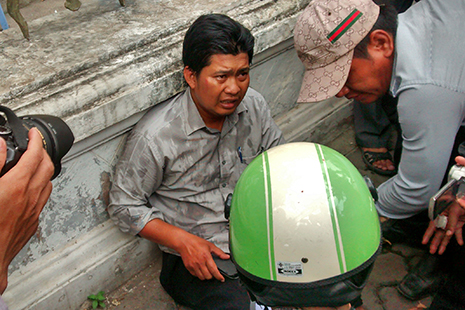“On the day of the protests, I saw him shot in the shoulder. I saw a guard throw his body on a truck and then he disappeared. I went to all the hospitals but I couldn’t find him,” said Sovann, who also serves as a worker representative.
Brutal police crackdown on Cambodia May Day rally
Demonstrators and pedestrians attacked with electrified truncheons and clubs

A passer-by who was chased down and beaten by police rests before being taken to receive medical treatment. (Photo by Abby Seiff)
UCA News | May 1, 2014
As scores of police wielding electrified truncheons and makeshift
clubs ran past her at this morning’s May Day rally, 40-year-old Chan
Sovann slipped into a corner, a framed photograph tucked under her arm,
and tried to remain inconspicuous.
At least two people were badly beaten, and several others—including
both local and foreign journalists—were also attacked after authorities
chased down protesters and passers-by, without provocation, at a rally
to mark International Workers Day.
“I wasn’t scared of them, and I didn’t run. I just stood here and
tried to be careful,” she said. “I have no idea why the police are
behaving so violently.”
As she spoke, she fiddled with the framed photograph of a young man
she had brought to the rally. The teen, 16-year-old Khem Sophath, worked
at Sovann’s factory until he was shot during a violent strike on
January 3. At least five people were killed that day, and Sophath has
not been seen since.
Human Rights Watch and other groups have repeatedly called for an
investigation into Sophath’s disappearance, but the police have remained
mute on the topic.
“He’s too young, he shouldn’t have been working, but of course
because of the poverty, they have to,” said Sovann, who was among those
calling for US$160 a month minimum wage.

Garment worker Chan Sovann (right) holds a photo of colleague Khem Sophath, 16, who was shot by police during a January protest and is presumed dead. His body has never been recovered. (Photo by Abby Seiff)
Today’s rallies come at a particularly tense moment for the Cambodian government. There has been a blanket ban on protests since January, when the authorities killed at least five people while violently suppressing garment worker strikes over the minimum wage, which is currently set at $100 a month. While the implementation of the ban has been piecemeal (elsewhere in the city hundreds of workers were permitted this morning to march, unimpeded, to opposition party headquarters), authorities have been especially touchy about rallies held at Freedom Park.
Once the epicenter of opposition rallies, the park remains closed to the public and heavily guarded. Yesterday, in anticipation of May Day, the authorities sealed off the park a block in each direction with razor wire, barricades, and 2.4-meter-tall steel barriers.
Workers who gathered on Thursday were alternately resigned and bemused by the heavy police presence that greeted them. Hundreds tried to gather at the National Assembly, where they hoped to present a petition calling for higher wages, only to encounter closures at every entrance.
“When the police set up these blockades, it means they block the citizens’ rights and the workers’ rights. It shows we’re not a real democracy yet,” said Om Ken Kanyasopheary, a legal assistant for the service workers' union.
“They use the National Assembly for what—power or people?”
As hundreds gathered by the blockade, unionists appealed to the police through loudspeakers mounted on tuk tuks, calling on them to “try to understand” and let the workers through. The police, in turn, responded by shouting through a squad car’s speaker: “That’s enough. Leave and don’t return.”
Eventually, the demonstrators did just that, slowly making their way down the city’s streets to the headquarters of the opposition Cambodia National Rescue Party—the sole group of officials happy to accept their petition.


No comments:
Post a Comment